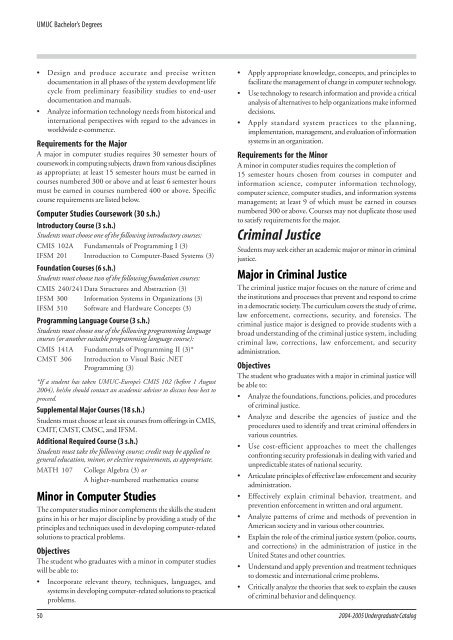Statements of Policy - UMUC Europe
Statements of Policy - UMUC Europe
Statements of Policy - UMUC Europe
You also want an ePaper? Increase the reach of your titles
YUMPU automatically turns print PDFs into web optimized ePapers that Google loves.
<strong>UMUC</strong> Bachelor’s Degrees<br />
• Design and produce accurate and precise written<br />
documentation in all phases <strong>of</strong> the system development life<br />
cycle from preliminary feasibility studies to end-user<br />
documentation and manuals.<br />
• Analyze information technology needs from historical and<br />
international perspectives with regard to the advances in<br />
worldwide e-commerce.<br />
Requirements for the Major<br />
A major in computer studies requires 30 semester hours <strong>of</strong><br />
coursework in computing subjects, drawn from various disciplines<br />
as appropriate; at least 15 semester hours must be earned in<br />
courses numbered 300 or above and at least 6 semester hours<br />
must be earned in courses numbered 400 or above. Specific<br />
course requirements are listed below.<br />
Computer Studies Coursework (30 s.h.)<br />
Introductory Course (3 s.h.)<br />
Students must choose one <strong>of</strong> the following introductory courses:<br />
CMIS 102A Fundamentals <strong>of</strong> Programming I (3)<br />
IFSM 201 Introduction to Computer-Based Systems (3)<br />
Foundation Courses (6 s.h.)<br />
Students must choose two <strong>of</strong> the following foundation courses:<br />
CMIS 240/241Data Structures and Abstraction (3)<br />
IFSM 300 Information Systems in Organizations (3)<br />
IFSM 310 S<strong>of</strong>tware and Hardware Concepts (3)<br />
Programming Language Course (3 s.h.)<br />
Students must choose one <strong>of</strong> the following programming language<br />
courses (or another suitable programming language course):<br />
CMIS 141A Fundamentals <strong>of</strong> Programming II (3)*<br />
CMST 306 Introduction to Visual Basic .NET<br />
Programming (3)<br />
*If a student has taken <strong>UMUC</strong>-<strong>Europe</strong>’s CMIS 102 (before 1 August<br />
2004), he/she should contact an academic advisor to discuss how best to<br />
proceed.<br />
Supplemental Major Courses (18 s.h.)<br />
Students must choose at least six courses from <strong>of</strong>ferings in CMIS,<br />
CMIT, CMST, CMSC, and IFSM.<br />
Additional Required Course (3 s.h.)<br />
Students must take the following course; credit may be applied to<br />
general education, minor, or elective requirements, as appropriate.<br />
MATH 107 College Algebra (3) or<br />
A higher-numbered mathematics course<br />
Minor in Computer Studies<br />
The computer studies minor complements the skills the student<br />
gains in his or her major discipline by providing a study <strong>of</strong> the<br />
principles and techniques used in developing computer-related<br />
solutions to practical problems.<br />
Objectives<br />
The student who graduates with a minor in computer studies<br />
will be able to:<br />
• Incorporate relevant theory, techniques, languages, and<br />
systems in developing computer-related solutions to practical<br />
problems.<br />
50<br />
• Apply appropriate knowledge, concepts, and principles to<br />
facilitate the management <strong>of</strong> change in computer technology.<br />
• Use technology to research information and provide a critical<br />
analysis <strong>of</strong> alternatives to help organizations make informed<br />
decisions.<br />
• Apply standard system practices to the planning,<br />
implementation, management, and evaluation <strong>of</strong> information<br />
systems in an organization.<br />
Requirements for the Minor<br />
A minor in computer studies requires the completion <strong>of</strong><br />
15 semester hours chosen from courses in computer and<br />
information science, computer information technology,<br />
computer science, computer studies, and information systems<br />
management; at least 9 <strong>of</strong> which must be earned in courses<br />
numbered 300 or above. Courses may not duplicate those used<br />
to satisfy requirements for the major.<br />
Criminal Justice<br />
Students may seek either an academic major or minor in criminal<br />
justice.<br />
Major in Criminal Justice<br />
The criminal justice major focuses on the nature <strong>of</strong> crime and<br />
the institutions and processes that prevent and respond to crime<br />
in a democratic society. The curriculum covers the study <strong>of</strong> crime,<br />
law enforcement, corrections, security, and forensics. The<br />
criminal justice major is designed to provide students with a<br />
broad understanding <strong>of</strong> the criminal justice system, including<br />
criminal law, corrections, law enforcement, and security<br />
administration.<br />
Objectives<br />
The student who graduates with a major in criminal justice will<br />
be able to:<br />
• Analyze the foundations, functions, policies, and procedures<br />
<strong>of</strong> criminal justice.<br />
• Analyze and describe the agencies <strong>of</strong> justice and the<br />
procedures used to identify and treat criminal <strong>of</strong>fenders in<br />
various countries.<br />
• Use cost-efficient approaches to meet the challenges<br />
confronting security pr<strong>of</strong>essionals in dealing with varied and<br />
unpredictable states <strong>of</strong> national security.<br />
• Articulate principles <strong>of</strong> effective law enforcement and security<br />
administration.<br />
• Effectively explain criminal behavior, treatment, and<br />
prevention enforcement in written and oral argument.<br />
• Analyze patterns <strong>of</strong> crime and methods <strong>of</strong> prevention in<br />
American society and in various other countries.<br />
• Explain the role <strong>of</strong> the criminal justice system (police, courts,<br />
and corrections) in the administration <strong>of</strong> justice in the<br />
United States and other countries.<br />
• Understand and apply prevention and treatment techniques<br />
to domestic and international crime problems.<br />
• Critically analyze the theories that seek to explain the causes<br />
<strong>of</strong> criminal behavior and delinquency.<br />
2004-2005 Undergraduate Catalog






